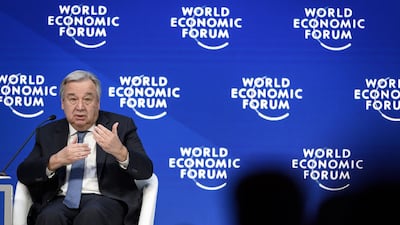There is a “wind of hope” blowing today that significant progress could be made towards securing political solutions to the many conflicts raging around the world in 2019, including in Yemen and Syria, United Nations Secretary-General Antonio Guterres told the World Economic Forum Annual Meeting in Davos on Thursday.
Mr Guterres laid out his aspirations for the year ahead to an audience of high-level officials, experts and chief executives on the third and penultimate day of the gathering in the Swiss resort.
“There is a wind of hope that is blowing ... in relation to the dramatic conflict situation we have in many parts of the world,” he said.
“Countries like the Central African Republic, South Sudan, countries like Yemen, Libya, Syria with all its complexities, are countries where we would like to make huge progress next year.”
A priority, he said, is to show the added value that the UN can bring to solving problems in the world.
“So a surge in diplomacy for peace, I think, is something that we are proving that we are there, that we are doing things that are necessary, and that nobody can replace the UN in this work,” he said.
"Nobody believed that it was possible to have an agreement, a first agreement in Yemen. It was possible. It will be very difficult to move, but we are pushing… and many other situations have been improving in recent times.”
A number of crises are interlinked, he said, presenting a situation that will require innovative responses from the international community.
“In the Sahel, you have conflict, you have terrorism, you have climate change impacting dramatically, you have huge problems ... and you have problems of governance that are very serious,” Mr Guterres said.
“It's a whole area in which all these mega problems are combined ... that is why we need this kind of multilateralism to address everything at the same time.”
He also pointed to the emergence of medium-sized powers that have become very influential.
“It's impossible to look at what happened in Syria without recognising the role of Turkey, Iran, Saudi Arabia. We can do the same in other conflicts around the world,” he said.
Mr Guterres underlined the “irreplaceable” work of the UN including by the World Food Programme, Unicef and the UNHCR.
“What is happening in the world… the tragedy would be much bigger without this work,” he said.
Jordanian Prime Minister Omar Al Razzaz delivered a business-friendly message in Davos, telling his audience that the worst of the country’s economic problems were now behind it.
Mr Al Razzaz also described the virtues of helping refugees, asking for support for nations taking in victims of conflict.
“Jordan is determined to do good and to do well,” he said, asking for “businesses from all over the world [to] come to Jordan and share in our dream of a renaissance in the Middle East”.
Jordan has taken in almost 1.3 million refugees from neighbouring Syria and Iraq in the past few years as conflicts led to humanitarian crises in both countries.
Saudi Arabia will announce five public-private partnerships projects in the next four months as it ramps up its Vision 2030 economic diversification strategy, the country's Finance Minister Mohammed Al Jadaan said on Thursday in Davos.
He was speaking on a panel titled ‘Next steps for Saudi Arabia’, which also featured Mohammad Al Tuwaijri, the Minister of Economy and Planning.
Mr Al Tuwaijri said “consistency, confidence and creativity,” will be the focus this year. There must be consistency in the implementation of policy, confidence by providing evidence of the country's progress, and creativity in finding solutions, he said.
A dynamic day in Davos also included sessions with Microsoft Chief Executive Satya Nadella in which he said his company was coming up with principles on the fair use of the technology and called for regulation to support companies’ efforts on this issue.
On Thursday, the forum addressed topics such as the number of women leaders in business, companies doing more to support people with disabilities in the workplace and opportunities in the space industry.
It also focused on an international coalition for cyber security, the crisis in Venezuela, giving children the skills they will need for future employment and a discussion with Nobel Peace Laureate Denis Mukwege.


